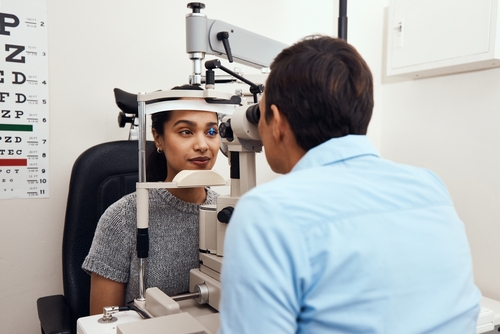Why Your Vision Deserves that Eye Exam You've Been Putting Off
July 20, 2023
Has it been years since you've seen an eye doctor? Whether or not you need glasses or contact lenses to see, you should have a routine eye exam regularly.
If you need glasses or contact lenses, you should have a routine eye exam annually to ensure your prescription is current and you can see the world around you clearly. But even if your eyes seem perfectly healthy, eye exams are essential to maintaining good vision, especially if you're over 40. Keep reading to discover why your vision deserves that eye exam you've been putting off!
Putting Off Your Eye Exam?

When you're an adult, life can get pretty busy! It's understandable that a few things can get forgotten or put off year after year.
But just like you shouldn't put off seeing your primary care physician for too long or seeing the dentist, you shouldn't put off seeing an eye doctor forever. If it's been years since you've been to the eye doctor, you may feel too embarrassed about going in.
You may be more embarrassed about how much worse your vision has gotten, but that's when it's most important to see the eye doctor! If you ever experience vision loss or discomfort, you should see an eye doctor immediately.
Even if nothing seems wrong with your vision, you should still have a routine eye exam regularly. When it comes to eye disease, the best-case scenario is having eye conditions diagnosed before you experience any symptoms so your eye doctor can help you prevent vision loss. Early diagnosis and treatment are the best way to keep your vision!
Eye Exams Can Save Your Vision

There are many different kinds of eye conditions. Most eye conditions that you may be at risk for are age-related.
But you can be at risk for these eye conditions when you're younger if you exhibit other risk factors. By being over 40, your risk for certain eye conditions increases, meaning you're at a higher risk for things like:
- Glaucoma
- Retinal disease
- Dry eye syndrome
- Presbyopia
- Cataracts
The earlier you have eye conditions diagnosed, the better. This is especially true for eye conditions like glaucoma and retinal diseases like diabetic retinopathy.
In their early stages, you may not experience any symptoms. The first symptoms you'll be able to notice are vision loss.
The trouble with these eye conditions is that it's irreversible once you've lost vision from them. Any damage to the eyes is also irreversible and permanent.
But the early signs of these eye conditions can be seen and diagnosed by your eye doctor when they examine your eyes during an eye exam. When spotted early, conditions like glaucoma are manageable. With early treatment, your ophthalmologist can slow the condition's progression and prevent further vision loss.
For this reason, routine eye exams are a must, as they are the only way to preserve your vision and save it from worsening.
Eye Exams Can Save Your Life
It may sound like an exaggeration, but an eye exam could help save your life. Although it's a little extreme, your eye doctor may be able to detect some life-threatening illnesses during an eye exam.

They may have few, if any, discernible symptoms, at least at first, but an eye exam may detect these illnesses and conditions. These can include MS, brain tumors, rheumatoid arthritis, thyroid disease, vascular disease, and vitamin A deficiency, to name a few.
Some of these symptoms and signs of disease can even go unnoticed during a standard physical because they're so subtle. This is especially true regarding certain neurological issues.
These can be hard to identify without looking directly at the brain. But how your eyes react to stimuli can tell your eye doctor if there's an issue with how your brain is working.
Eye exams can also benefit your overall health in less extreme ways. How healthy your eyes are may indicate certain nutritional deficiencies.
Your eye doctor can then tell you what areas of your diet may be lacking and recommend nutritional supplements and potential diet changes that will benefit your eyes and your general health.
When To Have Eye Exams

There's no doubt that eye exams are essential. But what many people don't understand is how often to have them.
The answer varies depending on a few factors. You should have an eye exam annually if you have refractive errors and must wear glasses or contact lenses.
If you don't need to wear visual aids and are under 40, you need a baseline eye exam once in your twenties and twice in your thirties. But if you experience vision changes or eye pain, you should see your eye doctor to determine what's causing these issues. You should also see an eye doctor more frequently if you have a family history of eye conditions.
Once you turn 40, your eyes should be examined every year or two. Once you're 65 or older, your eyes must be checked annually.
However, these recommendations will change if you're considered high-risk for eye conditions. If you have a family history of eye disease or medical conditions linked to eye disease, like heart disease, high blood pressure, and diabetes, to name a few, you may need eye exams more often, even if you're relatively young.
Your eye doctor will determine how often you need eye exams based on your family history and the health of your eyes. Follow their recommendation to ensure your eyes stay healthy, regardless of age.
Remember, regular eye exams can save your vision and even your life. You deserve the healthiest eyes possible, and the best way to do that is to stop putting off your eye exam!
Request an appointment at Maryland Eye Associates in Prince Frederick, MD, to schedule your eye exam and finally get your eyes back on track!



